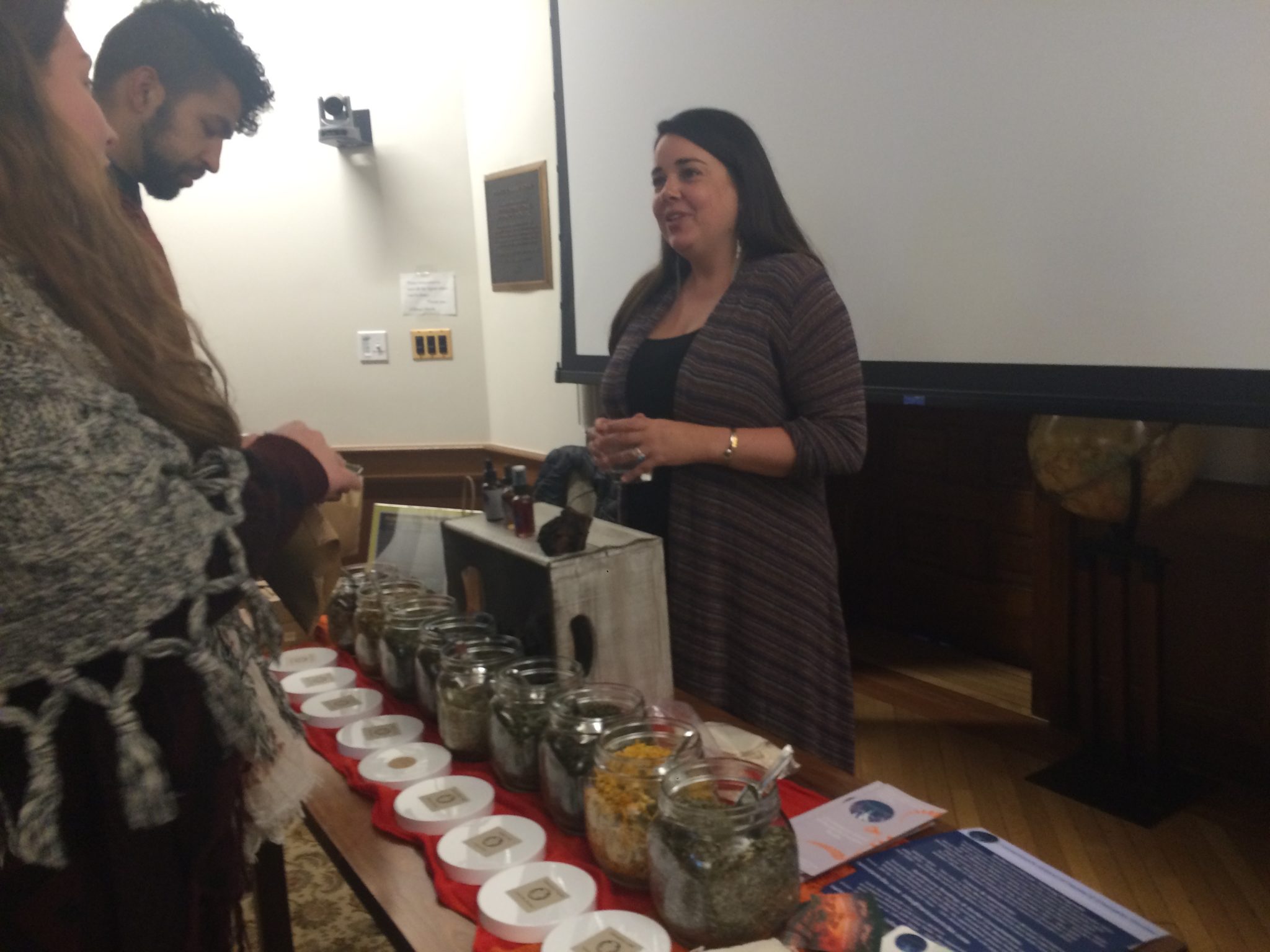
Lupo Passero, educator and founder of an herbalist school, visited campus on Saturday to teach students about the ancient art of herbalism and help them create their own blend of herbal tea.
Passero began her talk by describing the processing and usage of herbs — for medicinal and culinary purposes — while students passed around jars and vials of oils, extracts and dry herbs. One of these jars contained peppermint, which was used to make a refreshing afternoon tea for participants to enjoy while they watched the presentation. Around 25 people attended the event, which took place at Marsh Hall on Feb. 17.
Before relatively recent advances in medicine, cultures across the globe used herbs to prevent and treat various ailments, Passero said. In fact, according to the World Health Organization, a significant percentage of the world population still relies on herbal treatments as a primary source of medicinal aid. Passero said he believes there is no reason for herbalism and modern medicine to butt heads, given that the two serve different purposes and can often work in tandem.
According to Passero, herbalism is a venue through which individuals can access their familial and cultural histories by connecting with ideas and practices that they may have forgotten in the modern age.
“My father loves herbs,” Lenka Lazo FES ’18 said. “I remember him bringing in herbs and roots from the market. I wanted to recall that custom from my dad and know more about it,” she said, adding that her father first learned about herbs from his own mother, who used them for cooking and healing. Lazo decided to attend Passero’s presentation to help carry on that family tradition.
“It’s like an invitation for you to reconnect with the earth, to reconnect with your ancestors, to reconnect with your community in the land that you came from,” she said.
Passero, who founded the herbal medicine school Twin Star, remembered watching her grandmother prepare herbal concoctions when she was a young girl. Her interest in herbalism piqued when she was pregnant with her first child, at the age of 21. Reluctant to take Advil for every ache and pain, she decided to look into natural remedies. Passero decided to present at Yale for the first time last year, after Emily Sigman GRD ’19 reached out to her after taking one of her classes in New Milford.
For the first hour, Passero presented a brief overview of herbalism: its history, its modern uses and its distinctions from modern medicine. Students from the School of Forestry & Environmental Studies said the talk illuminated areas of ethnobotany that they had not been exposed to in the classroom.
After a short break, Passero began discussing the herbs she had brought so that the attendees could make their own teas. Passero touched on both the taste profile and properties of each herb, urging participants to consider both aspects when designing their teas. Mint, she said, is refreshing and acts as a stimulant, while chamomile is relaxing and eases anxiety. Fennel is sweet and aids in digestion. As Passero spoke, audience members took notes on the various herbs, perhaps contemplating which ones would blend well to form their ideal tea.
As Passero wrapped up, the group eagerly lined up behind the table of herbs and oils, waiting to fill small paper bags with scoops of dried herbs to take home, along with a reusable tea bag for steeping. In addition to the tea, the participants left with a small tin of salve made from beeswax and oil. Laura Brush FES ’19 said that she was surprised by how easy it was to make a simple herbal tea or remedy and incorporate it into her daily routine.
One of the challenges facing herbalists is that the practice can seem “unknown,” Passero said. But once people realize that the seemingly mystical science is actually already a large part of their lives — from the herbs they cook with to the chamomile tea they order at Starbucks when they’re stressed out — they are a lot more receptive, she added.
Sigman, the organizer of the event, said she first became interested in herbal medicine when she was diagnosed with ovarian cancer shortly after graduating college. Although she relied on Western medicine in her recovery, she said, she also found that learning about and using medicinal plants played a significant role in her healing journey.
Sigman said she thinks that learning about herbalism drove her appreciation of the link between the personal and the environmental — something that helped lead her to her current course of study in ecology.
“Herbalism is a really nice opening into that world, where you can understand in practice how human systems and plant systems and ecosystems are inextricably interlinked with one another,” she added.
The event was co-sponsored by student ethnobotany group Stigma, Yale Environmental Women, and Health and the Environment at Yale, with support from a Student Wellness Grant.
Maya Chandra | maya.chandra@yale.edu







